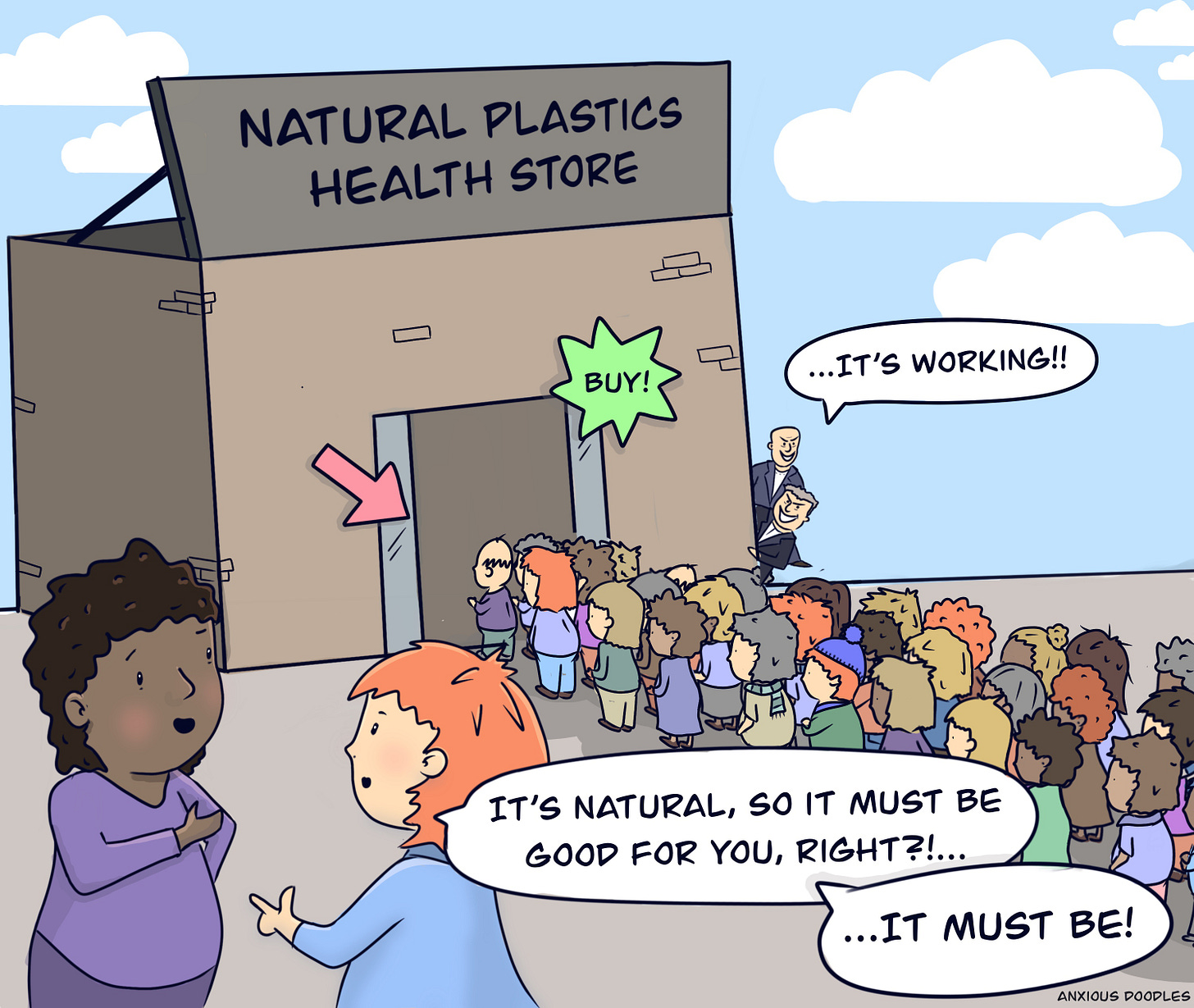Deliberate Hidden Dangers of Plastics In Service of Preserving Modernity
We've been fooled too many times. It's time to rethink what we’ve been told about safety and health when using plastics.
I’m sure you’ve heard of Natural Gas, right? … That ‘environmentally friendly’ fuel that the American Gas Association (AGA) spent billions on convincing us that because it is natural it is therefore the green alternative to keeping modernity alive… (1)
That green alternative whose “principal component is Methane”, which we now most commonly know as a more aggressive GHG (although dissipates faster). Well, that worked out well for Nature, didn’t it? Thanks, AGA! (2)
I’m highlighting this not because there is in fact a new ‘natural plastics’ campaign being peddled our way, but I’m merely raising a point that we’ve been fooled many times in the name of ‘profits for a few’. And today, we all need to wake up and realise the fight is unfair. But knowledge is power and this is where we can do our best to stay curious, and create those mindset ripple affects of change in our own social circles. Because as individuals, this is the most impactful thing we can do.
First point that needs to be made – there is no such thing as non-toxic plastic (3). Even if its pink, with flowers and smells like strawberries. It’s still a genius mix of refined oils and well engineered chemicals that can be potentially harmful to health (human and non human health). And yet, we all have plastics in our homes which keeps us more exposed and at risk. Unfortunately for us, plastic is cheap. So unless you have the means of upgrading to stainless steel or glass, you need to know how and how not to use plastics.
The most common rule I’ve come across, which will be the topic for today: Don’t mix plastics and heat.
The Swiss Food Packaging Forum explains on their site that “Some chemicals transfer from food packaging into the food. This process is called chemical migration. Packaging material, type of food, temperature, and storage time are factors affecting the migration of chemicals.” (4)
In fact HEAL (The Health and Environment Alliance) stated that “Chemicals are especially likely to migrate into food or liquids when the food contact materials are exposed to high temperatures, when contact times are long and when the food to material contact ratio is high.” (5)
What this means in context to managing your food supplies is that even if you keep those olive oil bottles out of the sun, or are microwaving your lunches in ‘microwave safe’ containers, they still have the potential to leach microplastics into the food via their fatty contents. Now, although products like oil are items you use very little of, they are typically items we use very regularly. And maybe you bring your lunches to work in your plastic container, and microwave them at lunch. Doing this once or twice probably won't have much affect on you, but doing this on a regular daily basis has more potential for harm.
It's the frequency of use that should be concerning, particularly at young ages where these chemicals have more time to add up in us due to the saturation and frequency in which we're seeing plastics in our every day lives, compared to the lives of our grandparents, for example.
Another relatable point came from Rolf Halden, director of the Center for Environmental Health Engineering at Arizona State University’s Biodesign Institute who commented in a National Geograohic article discussing the potential harms that come from drinking from single use plastic water bottles which have been exposed to heat. “If you drink water from one PET bottle, will that hurt your health? Probably not. But if you go through 20 bottles a day, then the question of safety is an entirely different one.” (6)
If we plan to keep these plastics in our homes, we need to be well equipped with the knowledge on how we use them. For me, this is especially important to lead by example to my two kids, to use it sparingly, wisely and be thankful for the means to not have to depend on them 100% of the time. Which is already a big deal.
Well, you know I’d love to spend 1,000 more hours on writing this post, but part of my mission here on Anxious Doodles is to deliver quick reads since I know you also are stretched for time. But this conversation will continue in the coming posts.
Please do stay tuned!
2 – e360.yale.edu/features/why-methane-is-a-large-and-underestimated-threat-to-climate-goals
4 – foodpackagingforum.org/resources/food-packaging-and-human-health
5 – env-health.org/IMG/pdf/15022016_-_heal_briefing_fcm_final.pdf




